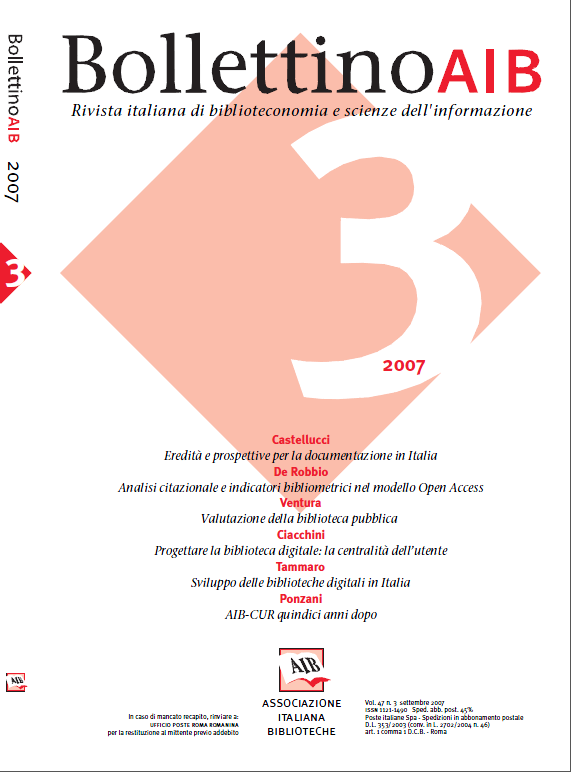An evaluation of public libraries: problems and tools for measuring their cultural, social and economic impact
Main Article Content
Abstract
Increasing attention is being paid in professional literature to the subject of the social impact of libraries, with particular emphasis on the sector of public reading: this is an area open to further investigation that at the present time seems to be especially linked to the executive function of library services and the relationships that exist between this and political interlocutors but that has repercussions at a purely theoretical level of the social and cultural effects that a library can produce.
A library wants to reveal the values and meanings that it presents before the eyes of the man on the street, local governments, possible stakeholders in general, in order on the one hand to legitimize its existence and on the other demonstrate the cultural, social and economic effects that its services produce within the sphere of the relative community. These values and meanings can take on an important role in the development of the library mission and the function and image that a library chooses to follow under the public profile. They can also be useful for dealing with questions of politics within the body to which they belong (especially as regards the allocating of financial resources), for choosing priorities and style of promotion, for streamlining collection management policies, for measuring the various service objectives, for making what the library offers increasingly more effectively close to what is requested.
Investigating the social and economic balance of libraries means investigating the role that these, librarians and the profession in general assumes, with possible repercussions on the methods of academic teaching of librarianship and the professional formation of librarians.
A study of their social impact leads us to reflect also on another matter: should a library be in the forefront in promoting cultural policy or should it confine itself to keeping its mission and action without the framework of the objectives of the body to which it belongs, acting as an instrumental organ and giving just this the task of intentionally preparing a cultural policy.
A library wants to reveal the values and meanings that it presents before the eyes of the man on the street, local governments, possible stakeholders in general, in order on the one hand to legitimize its existence and on the other demonstrate the cultural, social and economic effects that its services produce within the sphere of the relative community. These values and meanings can take on an important role in the development of the library mission and the function and image that a library chooses to follow under the public profile. They can also be useful for dealing with questions of politics within the body to which they belong (especially as regards the allocating of financial resources), for choosing priorities and style of promotion, for streamlining collection management policies, for measuring the various service objectives, for making what the library offers increasingly more effectively close to what is requested.
Investigating the social and economic balance of libraries means investigating the role that these, librarians and the profession in general assumes, with possible repercussions on the methods of academic teaching of librarianship and the professional formation of librarians.
A study of their social impact leads us to reflect also on another matter: should a library be in the forefront in promoting cultural policy or should it confine itself to keeping its mission and action without the framework of the objectives of the body to which it belongs, acting as an instrumental organ and giving just this the task of intentionally preparing a cultural policy.
Article Details
Section
Articles

This work is licensed under a Creative Commons Attribution-ShareAlike 4.0 International License.
